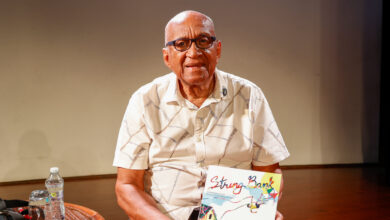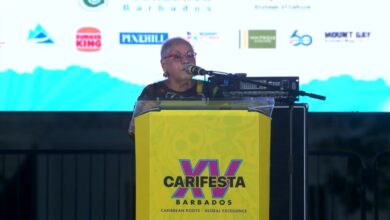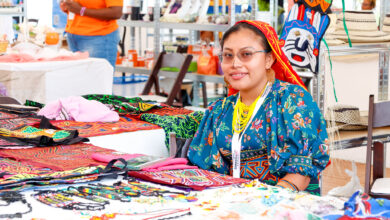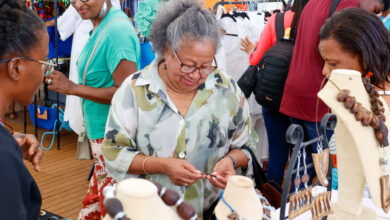(CARICOM Secretariat, Turkeyen, Greater Georgetown, Guyana) I have the distinct pleasure and honour to bring these brief remarks on behalf of the CARICOM Secretariat at this National Stakeholders Awareness Workshop on Intangible Cultural Heritage.
There has been increasing recognition globally, of the role which culture plays in sustainable development through both direct economic means, such as our cultural industries, as well as those that are not immediately monetised, such as promotion of social inclusiveness, equity and resilience. We sometimes fail to recognise for example, the influence of cultural factors on our lifestyles, our consumption patterns and the way in which we value our environment.
These are but a few examples. The Caribbean Community (CARICOM) has recognized the importance of promoting cultural diversity, safeguarding cultural heritage and developing creative industries to the sustainable development of the region. Central to this thinking is recognition of the need to create opportunities for the full development of the creativity of the people of the Community and in particular the youth.
About three and half years ago, CARICOM Directors of Culture met in Suriname and focused on a number of important issues, among these being the importance for CARICOM Member States of the signing international agreements on culture. To facilitate discussions on this issue, the CARICOM Secretariat had invited the UNESCO Kingston Cluster Office for the Caribbean to familiarise the Directors of Culture with the culture programme of this agency and to elaborate on the various UNESCO Conventions relevant to our Region.
At that Meeting, Directors of Culture agreed to redouble their efforts to ensure that Member States which had not already done so, sign and ratify the international Agreements on Culture, including the 2003 UNESCO Convention for the Safeguarding of the Intangible Cultural Heritage. This recommendation was supported by Ministers with responsibility for Culture at the Twenty-Second Meeting of the Council for Human and Social Development (COHSOD) held from 2-3 February 2012 in Guyana.
The CARICOM Secretariat, therefore, wishes to take the opportunity to commend this initiative by the Government of Guyana through its Ministry responsible for Culture, Youth and Sport, as well as the National UNESCO Commission and the UNESCO Kingston Cluster Office for the Caribbean, to raise awareness among a wide group of stakeholders during these two days, on the importance of the 2003 Convention for the Safeguarding of the Intangible Cultural Heritage.
Intangible cultural heritage, as defined in Article 2 of the 2003 Convention means “the practices, representations, expressions, knowledge, skills – as well as the instruments, objects, artefacts and cultural spaces associated therewith – that communities, groups and, in some cases, individuals recognize as part of their cultural heritage.” The Convention further explains that intangible cultural heritage is manifested in:
(a) oral traditions and expressions, including language as a vehicle of the intangible cultural heritage;
(b) performing arts;
(c) social practices, rituals and festive events; (d) knowledge and practices concerning nature and the universe; (e) traditional craftsmanship.
The Caribbean is perhaps best known and respected internationally for its many traditional as well as contemporary cultural expressions in areas such as music, art, craft, the literary and culinary arts, fashion, festivals and theatre. However, there are also many traditions, indigenous medicines, beliefs, stories, symbols and songs that are not well known but which constitute a vital part of the rich cultural heritage of the people of the region, and which make
us distinct and unique. CARICOM Member States therefore have a deeply vested interest in the preservation, protection and promotion of the rich cultural heritage of its people.
A number of our Member States have been actively engaged in the process that led to the adoption of several UNESCO conventions related to heritage. However, despite the significant rich cultural heritage, tangible and intangible, in our Region and the signing by some Member States to these UNESCO agreements, still others have yet to become States Parties to these instruments.
To date, thirteen (13) of the fourteen (14) independent CARICOM Member States have signed the 1972 Convention for the Protection of World Cultural and Natural Heritage. On the other hand, there are only seven (7) CARICOM Member States with a total of eight (8) sites on the World Heritage List and six (6) further sites on the Tentative List. Barbados is the most recent Member State which added Historic Bridgetown and its Garrison in 2011 to the List of World Heritage Sites. Only nine (9) Member States are States Parties to the 2003 Convention for the Safeguarding of the Intangible Cultural Heritage, eight (8) Member States are signatories to the 2001 UNESCO Convention on the Protection of the Underwater Cultural Heritage and also eight (8) are States Parties to the 2005 Convention on the Protection and Promotion of the Diversity of Cultural Expressions.
The Caribbean Community recognises that these Conventions are critical to the preservation and promotion of our cultural heritage and the CARICOM Secretariat has continued its efforts in encouraging Member States to become Parties to these Conventions. The commitment of our Region to these Conventions is based on the belief in the importance of safeguarding our cultural heritage for our next generation, to preserve the rich knowledge and skills of our societies and ensure that these are transferred from generation to generation. Our culture and cultural heritage contribute to engendering a sense of our Caribbean identity and our responsibilities and give us a sense of belonging.
The 2003 Convention commits us to:
(a) safeguard the intangible cultural heritage;(b) ensure respect for the intangible cultural heritage of the communities, groups
and individuals concerned;(c) raise awareness at the local, national and international levels of the importance
of the intangible cultural heritage, and of ensuring mutual appreciation thereof; and(d) provide for international cooperation and assistance.
The Convention continues to clarify that “Safeguarding means measures aimed at ensuring the viability of the intangible cultural heritage, including the identification, documentation, research, preservation, protection, promotion, enhancement, transmission, particularly through formal and non-formal education, as well as the revitalization of the various aspects of such heritage.”
To date, there are two CARICOM Member States which have masterpieces on the List of Intangible Cultural Heritage in urgent need of attention: Belize in 2001 with Language, Music and Dance of the Garifuna; and Jamaica in 2003 with the Maroon Heritage of Mooretown. There are many other masterpieces in our Region that should be inscribed on this List and for which our Member States need support in safeguarding this intangible cultural heritage for our future generations. It is against this background also that the Caribbean Community remains committed to its Caribbean Festival of Arts (CARIFESTA), our own regional multi-disciplinary festival for the arts
and culture, which was born 41 years ago here in Guyana as a regional forum to showcase our rich cultural heritage and give recognition to our great artists and cultural experts.
The Community will now stage the eleventh edition of CARIFESTA from 16-25 August 2013 in our neighbouring country Suriname. It is another opportunity to celebrate our cultural expressions, to promote our cultural diversity, to transfer our cultural heritage to our youth so that they can also experience it, live it, take ownership and contribute to the safeguarding of our cultural heritage. “Culture for Development” will be the theme at this CARIFESTA XI, focussing on culture as the core of our identity and on what defines our Caribbean-ness.
I express the wish that with the deliberations in this workshop on the 2003 Convention for the Safeguarding of the Intangible Cultural Heritage, not only will the process towards the ratification by Guyana to this Convention will be expedited, but that this will also lead to initiatives that will preserve Guyana’s rich cultural expressions, traditional knowledge, skills, languages, among others, for our young people, and that these be celebrated in our homes, our schools, our communities, our national events and also, through showcasing at future CARIFESTAs, will become known to other cultures in the world.
On behalf of CARICOM, I wish you all a highly productive and successful workshop





